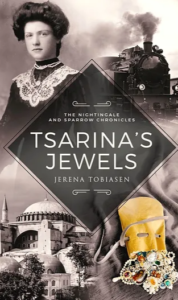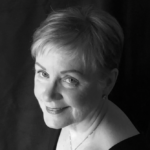Historical fiction author Jerena Tobiasen chats with me today about her novel, Tsarina’s Crown, first book of The Nightingale and Sparrow Chronicles.

Bio:
Jerena Tobiasen – award-winning author of The Prophecy, a 3-volume, historical fiction saga including The Crest, The Emerald, and The Destiny – lives in Vancouver, Canada. In 2023, Jerena released her fourth novel, Tsarina’s Crown, the first novel in a series she calls The Nightingale and Sparrow Chronicles. Her next novel, Tsarina’s Jewels will be released later this year.
If she’s not home, she’s likely travelling.
Jerena embellishes her writing by travelling to foreign lands, visiting museums and libraries, conducting interviews, and travelling in the footsteps of her characters. Her experiences and discoveries enrich the authenticity of the historical fiction she crafts.
Jerena also writes short stories and poetry. Several of her short stories, travel commentaries and an assortment of other writings can be found on her website jerenatobiasen.ca, where you’ll also find an invitation to join her newsletter.
Welcome, Jerena. Please tell us a little bit about Tsarina’s Crown.
In 1915, Simon Temple, a young naval officer from northeast England finds himself aboard RMS Guardian, patrolling the North Sea as part of the Germany blockade. By midyear, he’s in St. Petersburg, Russia on a private assignment for King George V. The three-month task turns into three years, embroiling him in the intrigues of two royal families, Russian politics and British espionage. As the Russian revolution consumes the country, Simon’s cover is threatened, and his safety compromised. He must escape the chaos before he’s captured, but his scheme becomes complicated when two others unexpectedly join him in a hasty departure.
Tsarina’s Crown is a fast-paced, historical drama that leads the reader from World War I at sea to the desperation of the Russian revolution. It’s full of action and intrigue, and just a little romance.
What inspired you to write this book?
In early 2018, I found myself with an unemployed protagonist. Later that year, I found the seed of a story in the Fabergé Museum in St. Petersburg, Russia—the Rosebud Egg.
When I began researching Fabergé eggs, inspiration bloomed, and my protagonist had a job!
As historical fiction requires, I spent hours researching historical events of the early 1900s. Fortunately, I had been to Russia twice, so I also had my own experiences from which to draw.
Excerpt from Tsarina’s Crown:
Simon returned the box to her grasp and watched her set it reverently on her lap. Raising the lid, she lifted the items lovingly. “Nikki gave these to me,” she said softly. “They’re all tokens of his love. I should cherish them, but they are the only things that are truly mine. The only things that I can sell.”
She lifted the egg from the box and caressed it. “He gave me this—the Rosebud Egg, Mr. Fabergé called it—to mark my coronation.” She held the red-enamelled shell and pressed it apart at the centre, causing it to open on a hinge.
“This,” she said, removing a yellow-enamelled rosebud trimmed in gold, “represents my favourite rose. It grows in the gardens of my childhood home. The gardeners here have tried to grow them in the greenhouse, but even in the summer it’s too cold for them.”
She pried the rosebud open and tipped out two more items. “This”—she held up a dainty gold chain from which dangled a cabochon ruby—“represents his heart, and this …” She opened her palm. “This is a miniature of the crown I wore on my coronation day. It was made with tiny diamonds, seed pearls, and a red spinel.” Her voice was forlorn. “I will treasure them always, in here,” she said, patting her breast. She placed the re-assembled egg in the box, closed the lid, and lifted the box for Simon to take.
What exciting project are you working on next?
I recently completed the manuscript for Tsarina’s Jewels; the next tale in The Nightingale and Sparrow Chronicles. In this story, I introduce Richard Temple, the brother of my protagonist Simon. Richard is a bit of a scoundrel and quickly finds himself in serious trouble. Of all the places to which he might escape, he runs to Türkiye where he lands right in the middle of the Turkish Revolution. Looming over this tale is Simon Temple’s nemesis, Ivan Vasiliev, a villain who survived Tsarina’s Crown.
When did you first consider yourself a writer?
I wrote my first short story in high school. It was a flop, and I never wrote another story until about ten years ago, when I decided I had a story to tell. I also started writing poems in high school, and I’ve never stopped.
Do you write full-time? If so, what’s your workday like? If not, what do you do other than write and how do you find time to write?
When I’m working on a novel, I will spend hours each day, first envisioning a story line, then researching material that will support it, and finally weaving everything together. During that time, I might work four to six hours a day. By then, I’ll need a break. Depending on the work, I may return to it later, or the next day.

By the end of the first draft of the manuscript, I could be carrying 80,000 to 90,000 words of story in my head. I try to stay focused. The sooner I have that first draft finished, the sooner I can start layering.
During the layering process, I might still write for hours, but I can take breaks.
Because my stories are historical and involve locations and details far from my home, I travel. Travelling allows me visit locations for sensory experiences. At the same time, I can wander through museums, scour libraries, and marvel at ruins and relics, all in the name of research.
What would you say is your interesting writing quirk?
I have a few:
My characters dictate my stories.
Although I’m known for writing twentieth century wartime fiction, that is not my preferred reading choice.
If I write a short story, it usually has contemporary content.
I can’t write a short short story. They are always long short stories.
As a child, what did you want to be when you grew up?
A teacher.
Anything additional you want to share with the readers?
I’ve broken two rules that writers are expected to obey:
Don’t ask a family member to read/comment on your work.
I ask my husband’s thoughts often. His feedback is invaluable. He reads all my short work but has yet to read one of my novels because, he says, he’s already heard them.
Don’t let your grade five teacher read your work.
I do. He’s very supportive and always has great feedback.
My stories are award-winning:
*2020 Canada Book Awards Winner, The Prophecy
*2020 Winner of Independent Press, Distinguished Favourite, Historical Fiction Series, The Prophecy
*2020 Finalist of Next Generation Indie Book Award, Series (Fiction), The Prophecy
*2020 Readers’ Favorite Bronze Medal, Historical Fiction – The Destiny
*2021 Hemingway Book Award for 20th Century Wartime Fiction, First Place – The Emerald
*2023 Hemingway Book Award for 20th Century Wartime Fiction, First Place – Tsarina’s Crown
Thanks for being here today!
